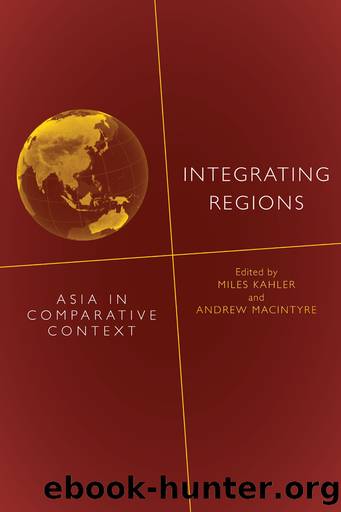Integrating Regions by Unknown

Author:Unknown
Language: eng
Format: epub
Publisher: Stanford University Press
Published: 2013-08-15T00:00:00+00:00
7
Economic Crises and Regional Institutions
C. RANDALL HENNING
Introduction
Regionalist movements are intimately connected to economic and financial crises. Most of the financial crises of the last four decades have had a strong regional dimension. We identify them as the âLatin American debt crisis,â the âEuropean currency crisis,â and the âAsian financial crisisâ because their impact has been geographically concentrated. Crises call into question the adequacy of multilateral arrangements for prevention and stabilization and, under certain circumstances, galvanize support for proposals to strengthen regional agreements and institutions. Once in place, regional arrangements can shield countries against the adverse effects of global financial turbulence, if they are well designed.
Our understanding of regionalism would benefit from more systematic analysis of its relationship to crises. This chapter examines the extent to which economic crises help or hinder the development of more effective regional institutions and addresses the determinants of institutional evolution and design in the Asian region. First, it conducts a structured comparison of the most important region-wide crises over the last four decades and their impact on regional institutions. By asking similar questions in each case, we can draw generalizations about the conditions that are conducive and averse to institutional building. Second, the chapter elaborates on aspects of cases that speak to key points in the present Asian discourse on regional institutions. While considering a common set of factors, the treatment here will sometimes explore instructive aspects of cases even when they might not fit with a common template.
After comparing these crises, the chapter concludes that five conditions are especially important in facilitating a constructive regional response to a crisis: a significant degree of regional economic interdependence (market integration); an independent secretariat or intergovernmental body charged with cooperation; webs of interlocking economic agreements; and, as elements of the multilateral context, conflict with the relevant international organization (such as the IMF) and acceptance by the United States of regional integration. These findings are further supported by the European sovereign debt crisis more recently. The chapter does not argue that regional movements can only be generated by crises, but that these conditions are conducive to institution building in response to them. Asian regionalism would be favored in the future by shocks that are external to the region, rather than coming from a member state, and responses from multilateral institutions that are averse to Asian preferences. Asian regionalists would be well served by using crises to ratchet up governmentsâ commitments to secretariats and intergovernmental bodies, establishing linkages among economic issue areas, and forging cooperation with multilateral institutions.
The following section discusses the nature and definition of âcrisisâ and âinstitution,â central concepts in this study. The third section addresses the causal links between crises and institution building, as well as the factors that condition regionsâ responses to crises. The fourth section presents five crisis cases. The fifth section draws conclusions from the comparison of cases and identifies conditions favoring further institution-building in Asia and strategies that advocates of Asian regionalism might adopt.
Defining the Concepts
The Oxford English Dictionaryâs first definition of âcrisisâ is âa time of intense difficulty or danger.
Download
This site does not store any files on its server. We only index and link to content provided by other sites. Please contact the content providers to delete copyright contents if any and email us, we'll remove relevant links or contents immediately.
The 5 Love Languages: The Secret to Love That Lasts by Gary Chapman(9815)
The Space Between by Michelle L. Teichman(6941)
Assassin’s Fate by Robin Hobb(6218)
Wiseguy by Nicholas Pileggi(5786)
Everything Happens for a Reason by Kate Bowler(4743)
Gerald's Game by Stephen King(4654)
Pillow Thoughts by Courtney Peppernell(4284)
A Simplified Life by Emily Ley(4163)
The Power of Positive Thinking by Norman Vincent Peale(4065)
Harry Potter and the Prisoner of Azkaban (Book 3) by J. K. Rowling(3360)
Resisting Happiness by Matthew Kelly(3341)
Girl, Wash Your Face by Rachel Hollis(3282)
Being Aware of Being Aware by Rupert Spira(3276)
The Secret Power of Speaking God's Word by Joyce Meyer(3220)
The Code Book by Simon Singh(3189)
More Language of Letting Go: 366 New Daily Meditations by Melody Beattie(3030)
Real Sex by Lauren F. Winner(3023)
Name Book, The: Over 10,000 Names--Their Meanings, Origins, and Spiritual Significance by Astoria Dorothy(2987)
The Holy Spirit by Billy Graham(2953)
